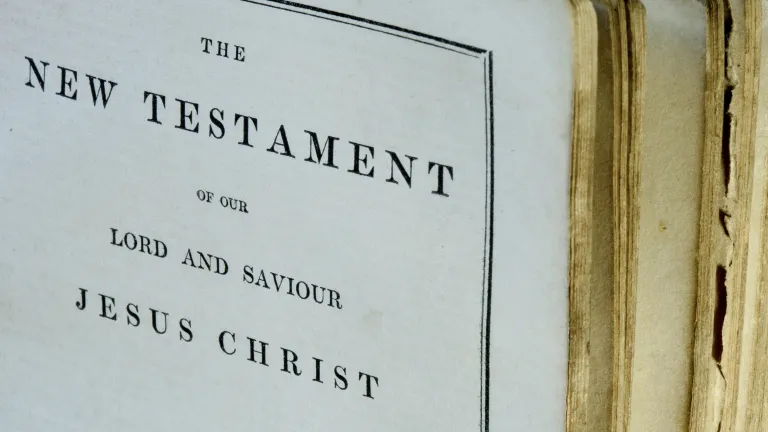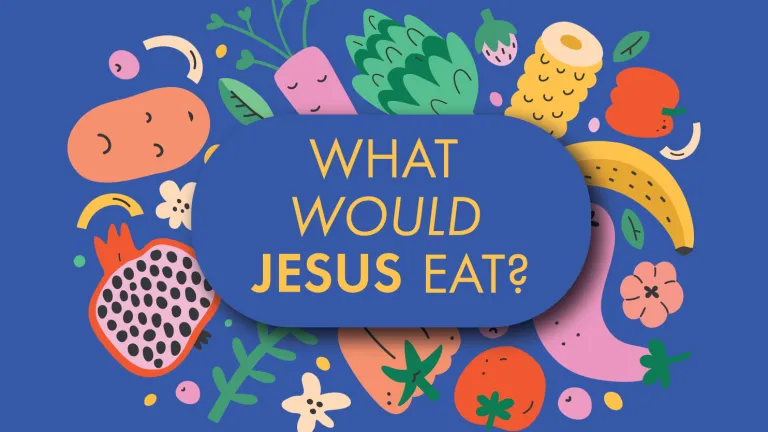God's Food Laws
We believe that those meats that are designated unclean by God in Leviticus 11 and Deuteronomy 14 are not to be eaten.
Scripture reveals that God created the vast array of animal life that inhabits our planet and further states that some animals were created for the specific purpose of providing food for mankind (1 Timothy 4:3). Although a Christian is not obligated to eat any meats, vegetarianism in its various forms, if practiced as a matter of religious requirement, is considered to be a spiritual weakness (Romans 14:2), and trying to impose that as a teaching to others is listed as a "doctrine of demons" (1 Timothy 4:1-3).
There is no clear statement as to when God first revealed the difference between those animals that are designated "clean" in Scripture and those that are not. The absence of a clear command on this matter in the first few chapters of Genesis should not be taken as proof that no instruction was given in this regard at the beginning of human history.
There are few clear commands in the early pages of the Bible, but the examples that are recorded reveal that standards of right and wrong were clearly understood. For example, there is no clear command against murder before Cain killed his brother Abel, but no one would conclude that murder was therefore acceptable before this point.
The book of Genesis can be described as a book of beginnings. It was written or compiled by Moses to provide a historical record of what took place, not to list specific laws. Readers shouldn't assume, based on absence from the beginning of Genesis, that any law not mentioned was not in existence from the beginning.
The first statement in Scripture concerning "clean" and "unclean" animals is found in Genesis 7:2, where Noah is commanded to take seven (or, more likely, seven pairs) of each kind of clean animal and only one pair of each kind of unclean animal.
When God told Noah to build a giant ark, He gave explicit instructions on its size, composition and design, yet Scripture records that God saw no need to instruct Noah about which creatures were clean and which were unclean. God's instruction and Noah's response clearly indicate that Noah already understood which creatures were clean and which were not.
At the conclusion of the great Flood, God told Noah: "Every moving thing that lives shall be food for you. I have given you all things, even as the green herbs" (Genesis 9:3). This did not mean, however, that every single animal was fit for human consumption. Many creatures by their very nature are dangerous, poisonous and place our health at risk.
The point being made here was that, even though there were few men left alive, and large and dangerous animals had been preserved, Noah and his family had no need to fear these animals. Animals, the verse makes clear, were to be for man's benefit. As a whole, they were given into man's control in the same way the green plants were given.
Note the parallel. Some green plants are suitable for food, some are suitable for building materials, some are for beautification and enjoyment, and some are poisonous and can sicken and bring death when ingested. In the same way, some animals are useful for providing food while others provide fibers for clothing, strength for working the land or protection from dangers. And like poisonous plants, some animals are not intended to be eaten.
Whenever animals are mentioned in Scripture as a food source or in connection with sacrifice before Israel received the Old Covenant at Mount Sinai, they are invariably animals designated as clean (Genesis 15:9—cow, goat, sheep, dove, pigeon; Genesis 22:13—sheep; Exodus 12:5—sheep or goat). The law of clean and unclean meats clearly predates the Old Covenant, regardless of what role they may have played within that covenant.
When the Levitical system was established, it was necessary to codify a number of matters that had already been in effect for some time. Two sections of Scripture, Leviticus 11 and Deuteronomy 14:3-21, codify which creatures are set apart as suitable for food and which are not. The term used to designate those animals whose flesh is acceptable for food is clean, while the term used for those that are not suitable for food is unclean. It is important that we "distinguish between the unclean and the clean" (Leviticus 11:47; compare Ezekiel 22:26; Ezekiel 44:23).
Scripture does not reveal exactly why God designated certain animal flesh as suitable for food while other flesh is not acceptable. There could be health reasons or symbolic reasons or, as there seems to be, both. God certainly knows why and how He created each animal. Yet even if God's determinations in this matter were purely just a test of obedience, He, as the Creator of all life, has full rights to make such decisions.
Various passages in the New Testament show that the laws of clean and unclean meats were still being observed by Jesus Christ and His followers. As eager as the religious leaders of Jesus' day were to accuse Him of violating their interpretations of religious law, there is no record that they ever confronted Him about His teachings or practices on this matter. Had He advocated eating unclean meats, it would have been an ideal way to besmirch His reputation with the masses, since they would have been appalled at such an idea.
Jesus' statement in an oft-misquoted passage in Mark 7:19 would have outraged the religious leaders had they interpreted it the way many people do today. His reference to purifying all foods here is often thought to refer to Him declaring all meat clean. But His statement actually refers to all foods being purged out of the body through bodily elimination. This has nothing to do with whether meats are considered clean or unclean.
Acts 10 is another commonly misunderstood passage that actually powerfully illustrates the early New Testament Church's understanding about clean and unclean meats—although this is not the primary purpose behind the vision described here.
The apostle Peter received a vision from God that instructed him to take the gospel message to gentiles (non-Israelites). During this vision, Peter three times refused to partake of the unclean animals shown him and remained puzzled about the meaning of the vision until God revealed that it was actually about people and not really about clean and unclean animals. It was revealed to Peter that no human being should be considered "common or unclean" (Acts 10:28-29).
This chapter ends with the Holy Spirit being given to the household of the gentile Cornelius as proof that God's calling to repentance and salvation was now going to people in all nations (Acts 10:44-48; see also Acts 11:1-18). Although this section of Scripture has been used to claim permission to eat unclean animals, it clearly indicates the opposite. The event here took place several years into the history of the New Testament Church, yet Peter rejected the idea of eating unclean meat, even going so far as protesting that he had "never eaten anything that is common or unclean" (Acts 11:8).
Paul, in a passage cited earlier, wrote of creatures "which God created to be received with thanksgiving by those who believe and know the truth" and described these creatures as "sanctified by the word of God and prayer" (1 Timothy 4:3-5).
The word used to describe these creatures, sanctified, means "set apart," and it carries the dual connotation of being set apart from something as well as for something. The only animals set apart by the Word of God, the Bible, are those listed in it as clean. They have been set apart from all other animals and for man's nourishment. The flesh of those creatures designated as suitable for food is to be received thankfully by those who believe and know the truth. Animal flesh designated as unclean is unfit for human consumption and should not be eaten.
God gave other important food laws as well. He declares as a perpetual statute that His people eat neither fat nor blood (Leviticus 3:17; Leviticus 7:22-26; Leviticus 17:10-14; Leviticus 19:26; Deuteronomy 12:16; Deuteronomy 12:23-25; Deuteronomy 15:23; 1 Samuel 14:33-34; Ezekiel 33:25). The forbidden fat referred to is that of mammals, not birds, and it is the covering fat that could be removed rather than the fat marbled in the meat.
The blood restriction applies to mammals and birds. The requirement that blood be drained from any meat before eating it was even communicated by the New Testament apostles to gentile converts accustomed formerly to eating strangled animals not drained of blood (Acts 15:19-20, Acts 15:28-29). As God says in Deuteronomy 12:25, "You shall not eat it, that it may go well with you and your children after you, when you do what is right in the sight of the Lord."





